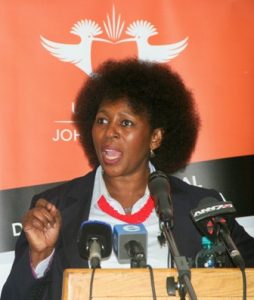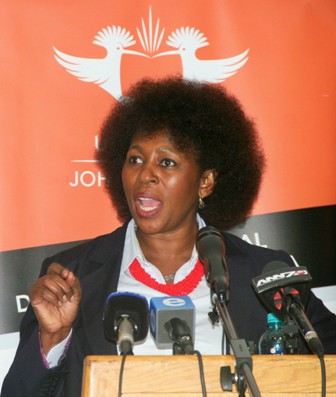
ON EVENING when former comrade, presidential hopeful, Lindiwe Sisulu promised free education to students from poor and middle-income households, if elected, whilst delivering a lecture on the legacy of Oliver Tambo at the Bunting Road Campus of the University of Johannesburg – ANC outcast Dr Makhosi Khoza made an emphatic call of teaching the party she recently resigned from, a lesson by voting it out of power – whilst delivering the 11th Helen Joseph Memorial Lecture, at the tertiary institution’s adjacent Kingsway Campus.
Addressing an audience which included UJ’s Vice-Chancellor Designate, Professor Tshilidzi Marwala and a fair smattering of students within the intimate space of the Council Chambers, Khoza didn’t waste time into swinging into what in places sounded like a tirade against the state of the Nation – as she passionately delivered a no-holds-barred address titled ‘A Cry for Leadership: Social Cohesion and Prosperity for all South Africans’.
With former first lady, Zanele Mbeki supposed to have been present Khoza began her speech by quoting late Argentine revolutionary who had this to say: “If you tremble with indignation at every injustice then you are a comrade of mine.” Helen Joseph, she suggested, epitomized the highest form of human consciousness – adding, by lacing the emphasizing of a point under the sub-heading of conscience vs consciousness with another quote by Martin Luther King Jr that, “an injustice anywhere is a threat to justice everywhere”.
Joseph, whom she described as possessing the highest form of awareness of the human spirit, in spite of having been born with the sort of skin pigmentation which would had accorded her all the privileges which came with being white in apartheid South Africa – instead opted for a life dedicated to freeing those who were oppressed, a life, consequently of persecution.
Evoking the roles and sacrifices by heroines of the Struggle who fell in the line of duty, Khoza pointed out that it would be remiss to not remember the many other phenomenal women and men of virtue, such as Ruth First, Victoria Mxenge, Jabu Ndlovu, Dulcie September, who did not survive to experience the greatest moment of South Africa, the 27 April 1994.
The only reason Joseph fought the apartheid system, contended Khoza, is because, it represented an unjust form of consciousness which was at odds with her moral conscience.
Clearly taking a swipe at the ANC, she zoomed in “Today, the organization she once associated with tells its Members of Parliament that they must not vote according to their moral conscience. The organization she once believed in now puts the life of an individual above that of a collective, the people”.
Conscience and consciousness are the chopsticks of morality , she attested, now in full flow, as she delved into the disconnect between conscience and consciousness by aiming a salvo at President JG Zuma’s way – whom she claimed, had, together with most of his NEC leadership, no moral conscience.
“On the 8th August 2017 ANC MPs, myself included, were told to divorce ourselves from moral conscience. These orders did not just come from President Zuma, but also from the ANC collective leadership”.
Urging her rapt audience to the fact that the ANCwas not a religion nor a product of calling, but a political organization whose relevance is determined by the quality of service and moral posture in society – as a constitutional democracy, the ANC ought to be taught a lesson by being voted out of power!
Dubbed a disruptor at 14 in her hometown of Pietermaritzburg, that hint was presently evident as she had her listeners, who extended to an overflow area with a live feed adjacent to the chamber, enthralled with her fearless type of oration.
“Moral and ethical objectivity, rationality and reasonability could never co-exist in the face of institutionalized corruption and patronage politics. There is no leader at the ANC December elective conference that would emerge without signing a pact with the Devil”, she slammed, to applause from the invitees.
Switching tack whilst touching upon aspects of the road to democracy, the self-proclaimed feminist whose resume include having been the youngest deputy mayor in South Africa at 26, then went on to lament the rate of violent crime which has earned the country as the highest ranking in that ignominy – but whilst rating a dismal number 139 out of 139 in science and mathematics in the world.
Pointing that neither even under apartheid was there a situation where 50 schools got burnt down in one area, as happened in Vuwani in 2016, she questioned why there have never been an MEC for education or minister responsible, fired.
Khoza also questioned loudly why then Police Commissioner Riay Phiyega, became the fall woman for the Marikana Massacre whilst the minister of police gets reshuffled to another portfolio, instead of being fired? “Yet, some fictitious intelligence report is enough to fire the Minister of Finance and his deputy”, she probed.
She then underlined that by understanding the leadership qualities of Helen Joseph’s stature, caliber and moral stamina – that would contribute in elevating the critical importance of moral and ethical leadership in building a prosperous and united society. “Why should we give the ANC another chance in 2019 when it has disregarded our will as the people of South Africa?” Khoza asked.
“A voter is a very powerful person in a democratic and constitutional dispensation.
A vote gets to hire and fire political parties. A vote is the most powerful instrument in the hand of a citizen”, she continued in the vociferous vein which typified her style.
Drawing attention to the need to shift the perspectives of the voter and the liberation movement, Khoza hinted that having political power concentrated in one or two parties like ours was suicidal, and that liberation struggle sentimentalism was reversing gains of hard earned victories.
“In order for South Africans to continue cherishing its glorious liberation struggle history, it is pivotal that we make necessary shifts soon so we may not end up thinking of our hard earned democratic victories as curses.”
Dr Khoza drew to the statistic that never before, has the future of South Africa rested in the mighty hands of black or white, Indian or coloured, female or male youth, who according to the Independent Electoral Commission (IEC), 80% of the 26.2 million registered voters in South Africa in 2016 were 30 years and younger – thus suggesting that the 2019 elections would not be fought on the struggle credentials tickets as, by 2019, more than 80% of voters would have been born from 1987 onwards.
“In honour of Helen Joseph, a phenomenal woman of substance who exhibited the unifying ideals of feminist empowerment, it is also important to remind South African women that they make up over 14 million out of 26 million registered voters in our land.
This represents a staggering 53% of the South African sky. In other words, the 2019 elections marks the change in the political landscape which has been dominated by ideologies”, she rolled on and then flourishing her delivery by invoking an Amil Cabral reminder that people are not fighting for ideas, but rather to wing material benefits, to live better and in peace and to guarantee the future of their children.
“The future of South Africa is in the hands of the youth and women. Our youth and women must rise and grab that mighty pen in 2019 to correct this anomaly”, she concluded to rapturous applause around the chamber.
“I think it is now safe to call you honourable. Like Helen Joseph, you’ve become a symbol of defiance … remind us about the class of the Freedom Charter!” complimented Rhodes scholar and the UJ’s director and South African Research Chair in African Diplomacy and Foreign Policy, Professor Chris Landsberg in a vote of thanks.

